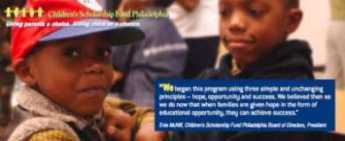Related Topics
Revisionist Themes
In taking a comprehensive view of a city, an author sometimes makes observations which differ from the common view. Usually with special pride, sometimes a little sullen.
Cultural
Culture and Traditions (2)
Right Angle Club 2009
The 2009 proceedings of the Right Angle Club of Philadelphia, beginning with the farewell address of the outgoing president, John W. Nixon, and sadly concluding with memorials to two departed members, Fred Etherington and Harry Bishop.
Customs, Culture and Traditions (2)
.
Education in Philadelphia
Taxes are too high, but the tax base is too small, so public education is underfunded. Drug use and lack of classroom discipline are also problems. Business and employed persons have fled the city, must be induced to return. Deteriorating education, rising taxes and crime are the immediate problems, but the underlying issue is lack of vigor and engagement by the urban population itself.
Children's Scholarship Fund (1)

|
| Children's Scholarship Fund of Philadelphia |
Ida Lipman recently visited the Right Angle Club, to acquaint members with the nature of the club's new charity, the Children's Scholarship Fund of Philadelphia. This fund could be seen as a response to the rising realization that the nation's leading social problem is fast becoming one of upgrading the educational strength of the current generation of poor people, who face hopeless odds competing for unskilled jobs against a vastly larger population of foreign poor people in a globalized economy. Our poor people can never hope to rise out of poverty by taking jobs that foreign competitors are willing to perform at even lower wages. And while everyone hopes our poor people can take on better-paying jobs, it requires better education to do it. Ultimately, the question for America is whether to place the emphasis on better teaching or better learning, and the two are not quite the same thing.
The educational problem of motivating children to higher attainments than their parents is a difficult social task in both urban and rural districts, but self-defeating peer pressures to hold down their classmates somehow seems a stronger force in the urban settings. In both environments, of course, the educational attainments of both the parents and the teachers have been aimed at a lower level than the task requires. It somehow proves unrealistic to shift expectations as rapidly as we need to, and part of the present problem is that the education industry has become demoralized by repeated defeats. Consequently, we are certainly lucky that philanthropic donors have been willing to support some radical experiments in the whole educational experience, including students, teachers and parents.
Thus, the Children's Scholarship Fund has been willing to dispense several thousand scholarships to private schools in the Philadelphia region, purely by lottery, without regard to the traditional guidepost of student merit. This policy would probably be disruptive if scholarships were universally available, undermining the spirit of meritocracy which is so central to our educational system. But since we are only partially addressing the failures of a system of universal free public education, a stronger argument can be made that changing the culture occasionally requires that we set aside the traditional incentive of rewarding the behavior we seek. The hope is that a demonstration project with such a radical change will set other motives into motion. Resources are limited; it is recognized that among the ninety percent of students who fail to receive the scholarship by lottery, there will be many who are more talented than the few who are lucky enough to get an award. The point is easily overlooked however that scholarship students must apply for this lottery, and be supported by partial financial assistance from their parents. These parents must sincerely want to raise the educational goals of their children, and convey that motivation to the kids in whatever way they are able to convey it. The pressure of less lucky playmates and neighbors to hold them back, it is hoped, will be lessened by the simple recognition that a lottery gives everyone an equal chance, provided only that they step forward and pledge themselves to try to succeed.

|
| John Walton of the Wal-Mart family |
It's a bold and imaginative approach, a highly counter-intuitive one. John Walton of the Wal-Mart family matches the contributions of other donors at fifty cents on the dollar through his family foundations, which was jointly founded with Ted Forstmann of the Wall Street firm. Many longitudinal studies will eventually show how much this bold and charitable venture really helps the students and the community; since it is private money in use, criticism should be held back until the results begin to be apparent. To whatever degree and in whatever way the scholarship fund is a success, the public must be willing to praise both its spirit of generosity, and its willingness to take a chance. Let's all mark this down in our notebooks, to see how it all turns out in ten or so years.
Originally published: Wednesday, December 02, 2009; most-recently modified: Wednesday, May 15, 2019